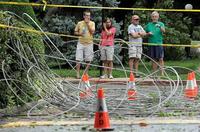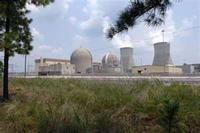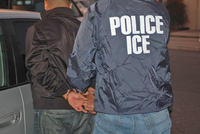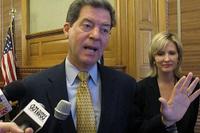-
Virginia receives $40 million in federal disaster aid following quake
Following the rare east coast earthquake last year, Virginia has received nearly $40 million in federal disaster aid
-
-
New York overhauls emergency response capabilities post-Irene

Last week New York Governor Andrew Cuomo proposed a series of major initiatives to bolster the state’s emergency response capabilities; the proposals specifically incorporate lessons learned from the state’s response to Hurricane Irene and Tropical Storm Lee
-
-
The challenge of fighting Lashkar-e-Toiba
In her debut guest column, Bidisha Biswas, an associate professor of political science at Western Washington University, explores the threat that Lashkar-e-Toiba poses to the United States as well as India and Pakistan and what can be done to stop the extremist group
-
-
SOUTHCOM deploys radar that sees through foliage, rain, darkness, and dust storms
Lockheed Martin’s TRACER is a light weight, low-frequency synthetic-aperture radar that can peer through foliage, rain, darkness, dust storms, or atmospheric haze to provide real-time, high-quality tactical ground imagery; U.S. Southern Command has just deployed the penetrating radar to support the Command’s counter-terrorism and humanitarian assistance missions, and disaster relief operations
-
-
Police wary of suicide attempts at 9/11 memorial

Aside from the threat of terrorism, the New York City Police Department worries about the risks of suicide at the national 9/11 memorial; The memorial is focused around two sunken granite pools where the World Trade Center towers once stood; some fear that visitors, so overcome by grief, may attempt to commit suicide by throwing themselves into the pools
-
-
Nuclear accident reawakens California’s anti-nuke movement
Following the discovery of a small leak at a nuclear power plant near San Diego, California in January, the state’s anti-nuclear movement has hit a fever pitch
-
-
Thwarting the botulinum neurotoxin
The botulinum neurotoxin is the most poisonous substance known to man, causing botulism; it can be used by terrorists for deadly attacks; the toxin paralyzes muscle cells by disrupting their connections with the nerves that tell them how and when to move
-
-
DHS to work with Netherlands on cybersecurity
On Wednesday DHS Secretary Janet Napolitano signed a letter of intent to work with the Netherlands on several critical cybersecurity initiatives
-
-
NRC approves first new nuke reactors since 1978

For the first time since 1978, U.S. nuclear regulators have approved the construction of a new nuclear power plant; the Nuclear Regulatory Commission (NRC) recently voted four-to-one in favor of granting Southern Co. a license to build two additional reactors at its Plant Vogtle nuclear facility near Augusta, Georgia
-
-
Growing pressure to investigate facial recognition technology
Concerned with the growing ubiquity of facial recognition technology, earlier this month, lawmakers sent a letter to the Federal Trade Commission urging the agency to “look further” into the technology
-
-
Fearful immigrants trickle back into Alabama
After Alabama enacted its tough new immigration laws last September, the state saw a large exodus of fearful immigrants who packed up their entire families and fled the state; since the law went into effect, some illegal immigrants have begun returning to the state
-
-
DHS suspends expansion of Secure Communities in Alabama

Due to ongoing federal litigation against Alabama’s tough new immigration laws, DHS has halted the expansion of the Secure Communities immigration program in the state; the law has been tied up in legal battles, and a federal appeals court has already blocked portions of it
-
-
One in three of military aircraft are drones
A report by the Congressional Research Service (CRS) recently made public reveals that unmanned drones now account for 31 percent of all military aircraft
-
-
Proposed EPA budget cuts funding from clean air and water grants
President Obama’s latest proposed budget for fiscal year 2013 cuts $105 million from the Environmental Protection Agency’s (EPA) budget, primarily from funds aimed at treating wastewater and drinking water
-
-
Kansas fights to keep bio lab project alive

Still reeling from the shock of finding out that the administration’s budget proposal does not contain any construction funds for the $650 million Bio Lab Level 4 facility in their state, Kansas political and business leaders vowed to fight to keep the project alive, including looking for alternative funding sources; the bio lab was considered the anchor of what is called an Animal Health Corridor stretching from Kansas State University in Manhattan, Kansas, to the University of Missouri in Columbia, Missouri
-
More headlines
The long view
What Does Netflix’s Drama “Adolescence” Tell Us About Incels and the Manosphere?
While Netflix’s psychological crime drama ‘Adolescence’ is a work of fiction, its themes offer insight into the very real and troubling rise of the incel and manosphere culture online.
A Shining Star in a Contentious Legacy: Could Marty Makary Be the Saving Grace of a Divisive Presidency?
While much of the Trump administration has sparked controversy, the FDA’s consumer-first reforms may be remembered as its brightest legacy. From AI-driven drug reviews to bans on artificial dyes, the FDA’s agenda resonates with the public in ways few Trump-era policies have.
The Center Can Hold — States’ Rights and Local Privilege in a Climate of Federal Overreach
As American institutions weather the storms of executive disruption, legal ambiguity, and polarized governance, we must reexamine what it means for “the center” to hold.
How to Reverse Nation’s Declining Birth Rate
Health experts urge policies that buoy families: lower living costs, affordable childcare, help for older parents who want more kids
Foundation for U.S. Breakthroughs Feels Shakier to Researchers
With each dollar of its grants, the National Institutes of Health —the world’s largest funder of biomedical research —generates, on average, $2.56 worth of economic activity across all 50 states. NIH grants also support more than 400,000 U.S. jobs, and have been a central force in establishing the country’s dominance in medical research. Waves of funding cuts and grant terminations under the second Trump administration are a threat to the U.S. status as driver of scientific progress, and to the nation’s economy.
The True Cost of Abandoning Science
“We now face a choice: to remain at the vanguard of scientific inquiry through sound investment, or to cede our leadership and watch others answer the big questions that have confounded humanity for millennia —and reap the rewards.”
